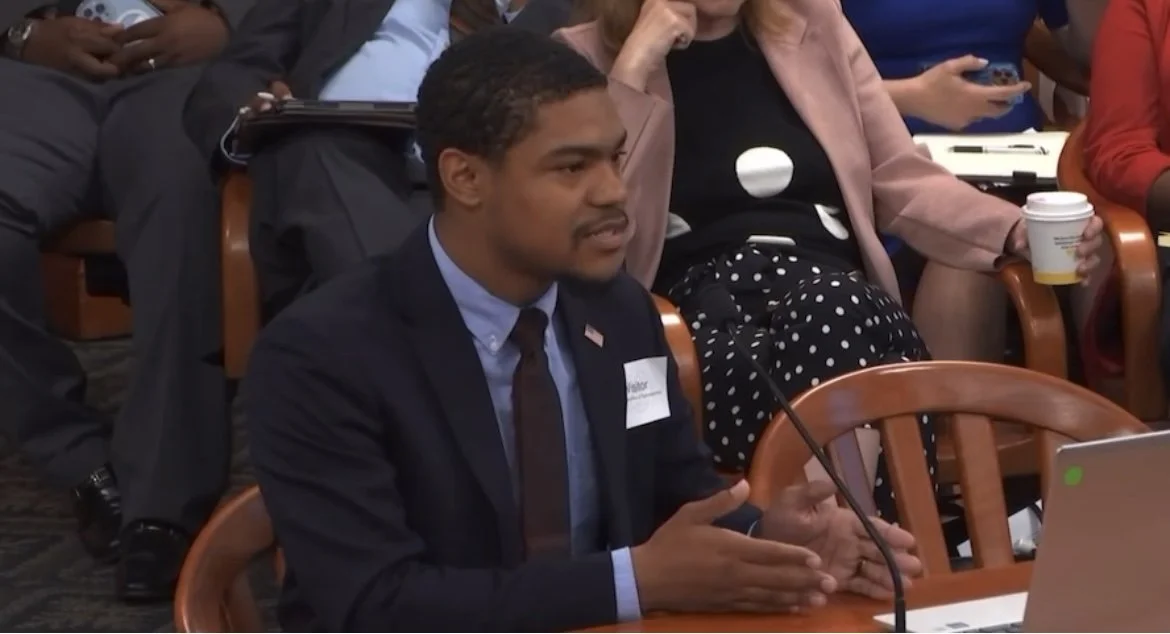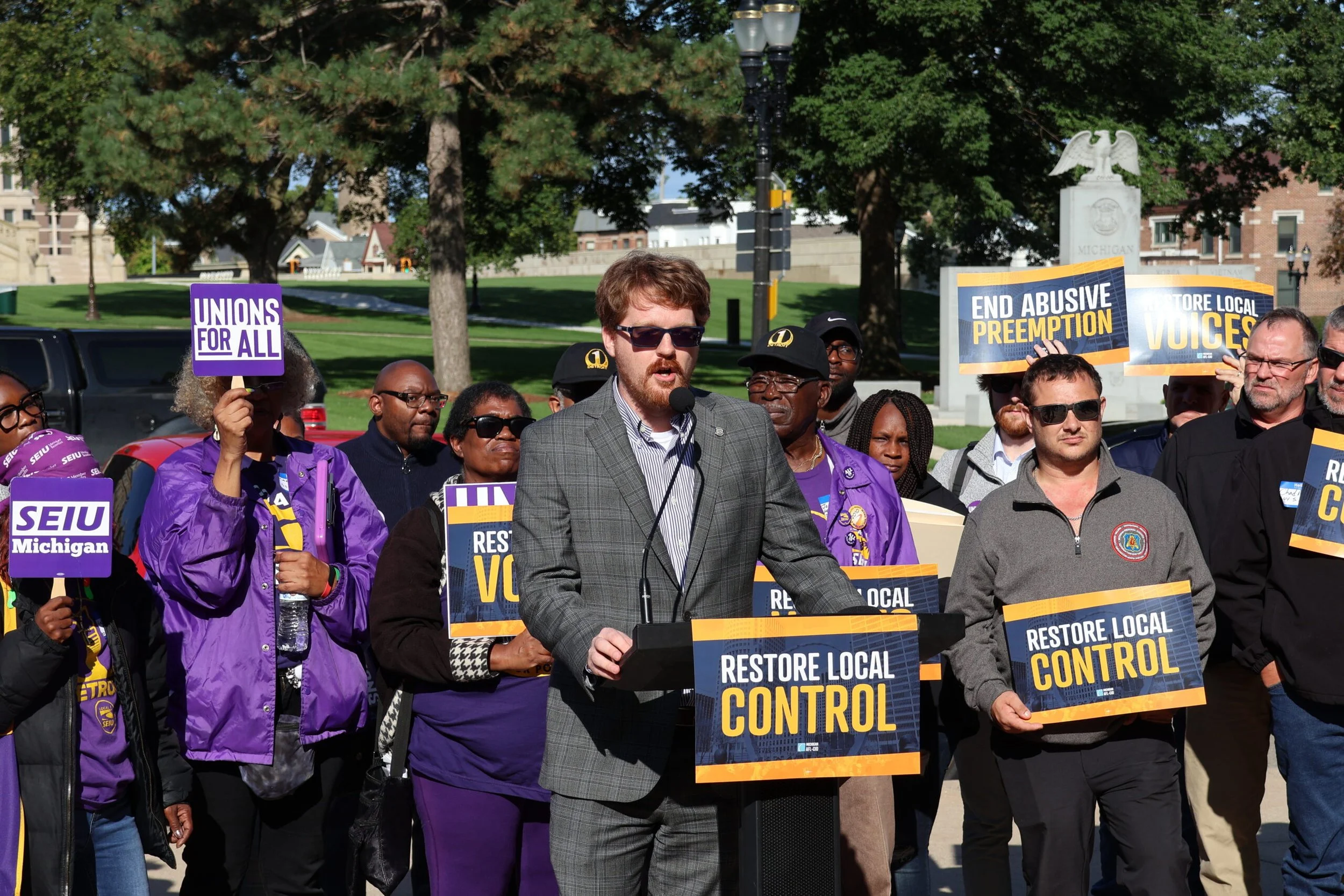
Local government Labor Policy Guide

Executive Summary
Unionized trades are a proven pathway for Michiganders to provide for their families, safeguarding workplace safety, job stability, and long-term financial security. They further bring external benefits to local communities and businesses by uplifting working people, cultivating a shared investment in the future, and materially improving economic outcomes.
Standing with organized labor means supporting everyday people, increasing the effectiveness of local government, and building stronger communities. Unlike most issues elected officials face, supporting workers and unions doesn’t require a balancing act between competing interests. Unions benefit local governments and communities as much as workers. By reducing turnover, long-term savings relative to poor quality non-Union work, and tax revenue growth from higher household incomes, Unions empower local governments to make smart, long-term investments in their communities, and ensure fiscally responsible best practices.
Supporting Unions is both popular and good governance:
An August 2024 poll of Berrien County voters commissioned by Berrien Forward showed a 31 percentage point difference between voters who were more likely to vote for a generic candidate described as “pro-labor” (40 percent of the sample) and those who said they would be less likely to vote for that candidate (9 percent).
Over half a million Michiganders are members of a Union
Union members have on average higher household incomes, higher levels of employment, and are more likely to own a home compared to non-union workers
75% of Michiganders want to expand workers’ rights– cutting across partisan and ideological lines
Local governments that contract with Unions see higher productivity, better project outcomes, and substantially fewer long-term costs associated with cost-cutting by non-union contractors.
Unions reduce the rates of both workplace injuries and fatalities, and generate further cost savings for governments thanks to higher rates of health insurance, employment, and retirement security.
Local leaders looking to take advantage of the benefits Unions provide to their communities should prioritize responsible contracting and taking action to promote local control and end preemption.

Responsible contracting
Overview
Standard “low-bid contracting” forces localities to take a very narrow view of projects and select the cheapest bid, regardless of other concerns with the firm. Low-bid contracting is associated with a number of significant issues for local governments like:
Artificially low bids that result in significant cost overruns
Improper licensing and poor quality work
Misclassified workers and labor practices that deprive workers of insurance and healthcare
Potential legal liability for local governments
Responsible contracting (sometimes also referred to as responsible bidding) solves these issues. Under responsible contracting, governments are able to take a holistic approach to evaluate proposals by considering setting additional criteria to consider in bids including:
Qualifications and track record in similar projects
History on workplace safety
Roots in the community
Subcontracting policies
Additionally, there is compelling evidence to suggest that the costs of projects under low-bid contracting are not meaningfully less than under responsible contracting:
A study of more than 1,200 public projects in Illinois and Indiana found comparable upfront costs between responsible contracting and low-bid contracting.
A separate study of 1,300 projects in Kansas found that local responsible bidding ordinances were associated with a savings of $67 per square foot relative to low-bid contracts.
Responsible contracting ordinances are an important step to ensure competent and qualified contracting and a fair, ethical, and efficient process. Responsible Contracting prevents the “race to the bottom” that low-bid contracting incentivizes and creates better outcomes for both local governments and the communities they serve.
Responsible Contracting has been implemented in several communities surrounding Berrien County including Kalamazoo, LaPorte (IN), and South Bend (IN) Schools. A number of communities including the City of Benton Harbor are considering proposals to become the first localities in Berrien County to implement Responsible Contracting.
Case Study: The Lake Michigan Authority
In 2007 the Lake Michigan Shoreline Water and Sewage Treatment Authority (Lake Michigan authority) used low-bid contracting for a multi-million dollar project to build new water towers. The Authority–covering St. Joseph Charter Township, Lincoln Charter Township, the Village of Stevensville, the Village of Shoreham, and Royalton Township–received four bids for the public bond funded project.
Three bids came from leading firms with strong track records on nearby projects. The fourth firm was Kentucky-based Caldwell Tanks, which had no prior experience in the region, had a significantly smaller and less experienced team, and faced public criticism for their prior work. Due to the low-bid contracting, Caldwell was awarded the contract for slightly over $3 million. Caldwell Tank’s bid was only $100,000 less than two of the more reputable firms, and all three were well below the estimated budget of $3.3 to $3.4 million.
The project did not work out as planned.
The Lake Michigan authority’s treasurer said he “has a notebook at least six inches thick documenting problems the water authority had getting Caldwell Tanks to complete the job.” Just months into the contract, the company announced they were running behind because it is “short-handed in our engineering department. That’s not your problem, but that’s the reality of it.” The pitfalls of bypassing firms with local expertise were quickly revealed when they promised they would get back on track by working through the winter. By the time winter came, they announced that they had overlooked the issues of pouring concrete in cold weather – with local observers pointing out the role doing so played in the collapse of Benton Harbor’s Vincent Hotel some eight decades earlier.
The Herald-Palladium mocked the situation with the headline “Brrrr! Too cold to build,” writing “They knew Michigan was cold and windy in the winter, but they didn’t think it was going to be this cold and windy. Dismayed by the frigid temperatures and piercing winds they found here after Thanksgiving, workers from Caldwell Tanks Inc. of Louisville, Ky., asked…to drop plans to start putting up water tanks in Lincoln and Royalton Townships over the winter.”
While the project was supposed to be completed the summer of 2008, Caldwell was just beginning to finish the construction of the first tank by February of 2009. When they attempted to fill it with water later that month, the water was draining out: there were leaks throughout. It wasn’t until nearly a year and a half after the project deadline that Caldwell finally finished the job – all the while, “the company kept accepting other jobs,” according to the Lake Michigan authority’s treasurer.
Even after they were finally done with the work they promised, Caldwell failed to meet the RFPs requirements for continued maintenance and were often months overdue on agreed-upon annual inspections and tank drainings. The Lake Michigan authority was also forced to pay for testing on the non industry standard, lower cost paint that they used on the towers themselves.
Citing stipulations in the contract allowing the withholding of some payment because of delays and problems, the Lake Michigan authority refused to pay $253,000 of the three million dollar contract. Caldwell disagreed, leading to a multi-year lawsuit and significant legal fees in the process. Overall, the ordeal went on until a settlement at the beginning of 2012 – almost five years from the beginning of the contract, and four after it was supposed to have been completed.
“It all just boils down to negligence on their part that they didn’t get it done on time,” the treasurer said. “I can’t believe we’re even talking about it.”
They may not have needed to had they used responsible contracting.
Take Action on Responsible Contracting
Responsible contracting can be implemented by municipalities, public schools, colleges, universities, and other local governments by setting a set of qualifications to help determine who a contract is given to.
Several organizations have developed examples of the policy language, including the West Michigan Construction Alliance which features sample ordinances for school districts and municipalities. Local governments who have adopted responsible contracting also publish their regulations online, including Jackson and Bay City. These resources are all linked here.

LOCAL PREEMPTION
Overview
Local policymakers are best equipped to make policy decisions for their communities because they know their communities. Current law doesn’t always see things that way. For well over a decade, reactionary figures in Lansing have undermined local governments by consolidating certain powers at the state level.
This is “state preemption,” and have been used to restrict policymaking on matters that range from zoning, to local tax codes, to decisions about labor standards. In 2015, then-Governor Rick Snyder used his Republican Trifecta to pass Public Act 105, a sweeping law preempting local governments from enacting:
Paid leave for municipal workers and public employees
Stronger labor standards for public projects
Higher minimum wage for workers in the jurisdiction
Local hiring goals and apprenticeship standards
Public Act 105 even restricts local leaders from being able to extract benefit agreements to support public parks, green spaces, and other public goods from developers receiving tax breaks. Snyder’s attempt to weaken labor standards and lower wages has forced the state to block local leaders from addressing the needs of their constituents. Government functions best when each level of government is empowered to make decisions about the issues they can directly impact. Preemption arbitrarily makes decisions for local governments and harms local elected leaders’ ability to address the issues facing their constituents.
Case Study: The Prevailing Wage
The prevailing wage requires that contractors pay their workers an hourly rate equal to the average local wage while working on publicly-funded projects. These ordinances are commonplace across the country in red and blue states alike, and have a long history here in Berrien County dating back a hundred years when they were used to help support farmers. Then and now, prevailing wage ordinances support local workers, ensure quality labor, and lift standards by making contractors on publicly-funded projects pay their workers an hourly rate in line with the average local wage. Instead of incentivizing bidders who cut corners and focus only on the bottom line, prevailing wage ordinances attract well-trained, local labor that results in higher quality work that can save tax-payers money.
In testimony to the State House Labor Committee last term, Berrien County Commissioner Chokwe Pitchford compellingly made the case for the importance of re-instating prevailing wage and ending local preemptions.
Responding to a legislator’s arguments that prevailing wage would make Benton Harbor unable to compete with St. Joseph due to their economic disparity, Pitchford said: “Let me challenge your premise. Why would someone from Benton Harbor not be able to work a job in the City of St. Joe?...That is why these preemption laws have to go. Because of the emergency managers that were put in place that crippled the city of Benton harbor for years, when people were only able to come to meetings as elected officials, open meetings and closed meetings. The city of St. Joe and the city of Benton Harbor need to be more economically connected, that is the answer here: to stop putting people into silos, and islands, and acting like we have to be divided communities. Do not pit the city of Benton Harbor against the city of St. Joe – people have done that for forty or fifty years, and I’m tired of it. We can be one community, and we can all benefit from pro-labor laws.”
Rep. Joey Andrews [D-St. Joseph] has led the fight in Lansing to re-instate prevailing wage and undo the damage caused by preempting local policymakers ability to make decisions appropriate for their communities. “Michigan workers are hardworking people who deserve stability, good-paying jobs and a voice at the bargaining table...This legislation gives unions the resources they need and deserve, and workers the chance to land good-paying jobs that will help them pay the bills, feed their families and afford the increased costs of living.”
Rep. Andrews’ push has been strongly supported by local leaders across Michigan, and numerous advocacy groups including the Michigan Municipal League, the Michigan Townships Association, and the Michigan Association of Counties.
A 2002 story reported by the Herald-Palladium about the bidding process for a multi-million dollar electrical contract with the St. Joseph School District illustrates the cons with going against prevailing wage. After soliciting proposals for the construction of a new school, district officials awarded the contract to a firm hundreds of miles away that had a track record of 31 OSHA violations, had failed to follow certification rules on a previous contract in Oakland County, and consistently paid unskilled laborers under the prevailing wage. By undermining a prevailing wage, the district both overlooked quality and made competition by local, skilled workers impossible.
Take Action on PREEMPTION
Local leaders can play a major role in pushing back against harmful preemptions by advocating for their leaders at the state level to find a legislative fix, as well as educating their constituents on the reasons they should do the same. Several local governments in Berrien County and across Michigan have passed resolutions calling for restoring local control by ending unnecessary state preemptions. Many have even organized rallies to encourage their State Representative and State Senator to stand with local control and bring decision making back into the hands of those who understand their communities best.

REFERENCES & FURTHER READING
Banerjee, Asha, Margaret Poydock, Celine McNicholas, Ihna Mangundayao, and Ali Sait. “Unions Are Not Only Good for Workers, They’re Good for Communities and for Democracy.” Economic Policy Institute, December 15, 2021. https://files.epi.org/uploads/236748.pdf.
Glass, Aurelia, David Madland, and Charles E. Weller. “Unions Help Increase Wealth for All and Close Racial Wealth Gaps.” Center for American Progress, September 6, 2021. https://www.americanprogress.org/wp-content/uploads/sites/2/2021/09/UnionsWealth-brief-2.pdf.
Haynor, Ed. “Responsible Construction Contracting for Local Governments in Michigan.” West Michigan Construction Alliance, April 14, 2008. https://www.wmca.info/files/ResponsibleConstructionContractingMunicipal.pdf.
Horner, Debra, and Thomas Ivacko. “Michigan Local Government Leaders’ Views on Their Employee Unions: Few Changes in Relationships or Impacts as Right-to- Work Comes and Goes.” The Center for Local, State, and Urban Policy, July 2023. https://closup.umich.edu/sites/closup/files/2023-07/mpps-spring-2023-unions.pdf.
“Legislative Policy Committee Meeting.” Muskegon City Hall, November 30, 2022. https://muskegon-mi.gov/documents/pdf/4273.pdf.
Manzo IV, Frank, Andrew Wilson, and Robert Bruno. “Construction Apprenticeships as a Career Development Alternative in Michigan.” Midwest Economic Policy Institute, August 3, 2023. https://illinoisupdate.com/wp-content/uploads/2023/02/mepi-pmcr-michigan-apprenticeship-final.pdf.
McKernan, Jen. “Rick Snyder Took Power from Michigan Cities. This Legislature Must Restore It.” Detroit Free Press, October 24, 2023, sec. Editorials. https://www.freep.com/story/opinion/contributors/2023/10/24/rick-snyder-michigan-republicans-local-preemption-repeal/71131999007/.
“Municipal Solidarity Index 2023.” Michigan AFL-CIO Advocates, 2023. https://advocates.miaflcio.org/wp-content/uploads/2024/04/AFL01_Index_Municipal-Operations.pdf.
“Responsible Contracting Seen as a ‘building Block’ for Unions, Contractors.” Michigan Building and Construction Trades Council, February 6, 2004. https://www.michiganbuildingtrades.org/newspaper/responsible-contracting-seen-as-a-building-block-for-unions-contractors.
“Union Membership in Michigan Grows Despite Decades of Anti-Union Policy.” Michigan AFL-CIO, January 20, 2023. https://miaflcio.org/union-membership-in-michigan-grows-despite-decades-of-anti-union-policy/.
Wilson, Andrew, and Frank Manzo IV. “The Impact of Responsible Bidder Ordinances on Union Contractors in Illinois and Indiana.” Illinois Economic Policy Institute, January 5, 2022. https://illinoisupdate.com/wp-content/uploads/2022/01/ilepi-impact-of-new-rbos-in-illinois-and-indiana-final.pdf.


